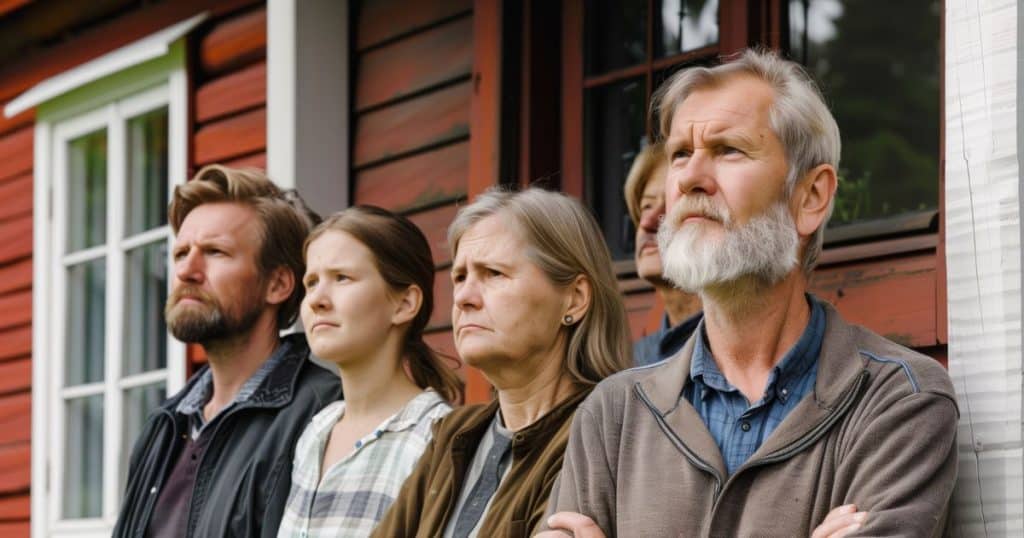I always thought I was destined to be the family’s perpetual scapegoat, taking the blame for everything.
But, one day, I realized that being my family’s punching bag was not something I wanted to continue, and I decided I’d had enough.
I confronted the stigma, questioned my role in a narrative not of my making, and dared to challenge the status quo.
Have you ever wondered about the hidden strength and resilience within those who have endured societal blame?
In my experience, I learned that when the scapegoat fights back, a transformational journey begins. A good one, at least for me.
Through my story, I’ll walk you through the incredible changes that unfold when the scapegoat seizes control of their identity and embarks on a path to empowerment.
- When a scapegoat fights back, it can disrupt family dynamics and lead to tension. But it also offers the potential for positive change within the family.
- Scapegoats may face emotional struggles, including stress and anxiety. Fighting back often leads to newfound empowerment and increased confidence.
- Scapegoats are some of the mentally strongest individuals in the narcissistic family dynamic. They are resilient and emotionally intelligent
Table of Contents
What Happens When the Scapegoat Fights Back?

When a scapegoat child fights back, they can experience a mix of emotional and relational consequences.
While the journey can be challenging, it often leads to personal growth and a potential for positive change within the family system.
Below are some common outcomes based on my personal experiences:
- Change in family dynamics: Challenging their role as the scapegoat can disrupt established family dynamics. It may lead to tension, arguments, or attempts to maintain the status quo from other family members who benefit from the scapegoat’s role.
- Emotional struggles: Scapegoats often carry emotional burdens. When they fight back, they may experience increased stress, anxiety, or depression as they navigate the conflicts and emotions that arise.
- Isolation: Scapegoats may face social isolation or rejection from family members who resist their efforts to break free from the role. This can be emotionally challenging, as they may feel alone in their struggle.
- Empowerment: On a positive note, when scapegoats fight back, they often discover a newfound sense of empowerment and self-worth. This can lead to personal growth and increased confidence.
- Positive change: In some cases, standing up to the scapegoat role can lead to positive changes in family dynamics. It might encourage other family members to reflect on their behavior and potentially lead to healthier interactions.
What Happens to My Family Dynamic When the Scapegoat Fights Back?

When the scapegoat in a family dynamic fights back, it often leads to a period of upheaval and conflict.
The family’s equilibrium is disrupted because the role the scapegoat plays in maintaining the status quo is challenged.
The narcissistic family member who has been projecting their issues onto the scapegoat may escalate their behavior to regain control.
Other family members might feel compelled to take sides, which can lead to increased tension and possibly a fracturing of family relationships.
When I began to challenge the scapegoat role assigned to me in my family, my initial reaction was intense.
My narcissist mother, the central figure in our family’s dysfunction, doubled down on her criticisms and attempts to control.
It felt like a storm had hit our household, with each confrontation more charged than the last.
I remember the confusion and hurt in my siblings’ eyes, torn between their loyalties and their own understanding of right and wrong.
Despite the turmoil, I found an unexpected resilience within me.
With each stand I took, a piece of my true self emerged from the shadow of the scapegoat.
I found allies in friends and mentors who saw my struggle and offered support.
The journey was painful; holidays and family gatherings often felt like battlegrounds where I had to defend my new boundaries and my emerging sense of self.
But fighting back also brought an unforeseen gift: some family members began to reflect on our dynamics and their roles in it.
My father, who had long been a silent observer, started to voice his own concerns, emboldened by my defiance.
We experienced moments of genuine connection, brief interludes in the chaos where we saw each other not as roles to be played but as individuals with our own hurts and hopes.
The process of fighting back, of asserting that I would no longer be the family’s emotional dumping ground, was transformative.
It didn’t happen overnight, and it wasn’t without loss, some relationships frayed, perhaps beyond repair.
Yet, this rebellion reshaped our family dynamic in profound ways, opening up possibilities for healing and honest communication that had previously been unimaginable.
Through this struggle, I learned the power of my own voice and the importance of standing up for one’s truth, no matter how difficult the path may seem.
How Does a Narcissist in the Family React When the Scapegoat Fights Back?

When a scapegoat in a family challenges the role assigned to them, particularly in the presence of a narcissistic family member, the dynamics can become tumultuous.
The narcissist’s reaction to the scapegoat’s defiance often reveals their manipulative and controlling tendencies.
In my story, I witnessed this firsthand as I fought back against the role of the family scapegoat.
Here’s what you can expect from a narcissist if you, as the family’s scapegoat, decide to fight back:
- Anger and defensiveness: Narcissists typically react with anger and defensiveness when the scapegoat defies their assigned role. They may view the scapegoat’s actions as a threat to their control and authority within the family.
- Gaslighting: To maintain their dominance, narcissists often employ gaslighting tactics. They may deny any wrongdoing, manipulate the narrative, and attempt to make the scapegoat doubt their experiences and emotions.
- Retaliation: Narcissists may resort to retaliation against the scapegoat, using various means to reestablish their dominance. This could involve spreading rumors, undermining the scapegoat’s credibility, or making attempts to further isolate and control them.
- Triangulation: Narcissists frequently employ triangulation by involving other family members to take their side against the scapegoat. This tactic is designed to divide and conquer, making it harder for the scapegoat to gain support within the family.
- Shifting blame: In response to the scapegoat’s resistance, narcissists often shift blame onto the scapegoat. This deflects attention from their own behaviors and casts the scapegoat as the problem.
When a scapegoat fights back against a narcissist in the family, it typically leads to a challenging and tumultuous period of emotional manipulation and conflict.
However, the scapegoat’s empowerment can ultimately disrupt the narcissist’s control and initiate changes within the family dynamic.
Why Are Scapegoats Mentally the Strongest in the Narcissist Family Dynamic?
Scapegoats tend to emerge as some of the mentally strongest individuals in a narcissistic family dynamic due to the incredible challenges they face.
Constantly subjected to blame, manipulation, emotional abuse, and isolation, they are forced to develop unique coping mechanisms and inner strength.
In my story, I personally experienced the mental fortitude that arises from being the family scapegoat.
The emotional abuse I endured, particularly from my narcissistic mother, compelled me to build resilience and self-awareness.
Challenging the unfair role assigned to me demanded emotional intelligence and a firm sense of self-worth.
As I confronted my circumstances and decided to fight back, I cultivated a strong sense of empathy and understanding.
This often stems from my own pain and experiences, allowing me to connect with others who have endured similar hardships.
The adversity faced by scapegoats, while emotionally taxing, can ultimately lead to remarkable personal growth, a deeper appreciation for authenticity, and a unique ability to navigate complex emotional landscapes.
This mental strength is a testament to their resilience in the face of adversity.
Related Posts:
- How to Heal After Being the Scapegoat of the Family? My Side of the Story
- Scapegoat of the Family: I Didn’t Allow Myself to Be a Victim
- Family Scapegoating Abuse: Nothing Is Permanent, I Survived and Thrived
- How to Stop Being the Scapegoat: In Family, Relationships & Adulthood
- Why Am I Always the Scapegoat in My Family? And How I Got Out?
Frequently Asked Questions
What happens to the scapegoat when they grow up?
Growing up in a dysfunctional family, many scapegoat children carry the scars of emotional abuse and manipulation. Some may struggle with low self-esteem issues, while others turn to drugs or alcohol to numb their pain.
What is the pain of the scapegoat?
The pain of the scapegoat is marked by deep-seated insecurity stemming from narcissistic abuse within the family. Consistent blame and negative treatment can lead to a distorted sense of identity. As such, they often struggle to feel worthy of love and respect.
Why does the family hate the scapegoat?
The family’s hatred of the scapegoat often stems from the dynamics set by the narcissistic parent. Scapegoats are often the ones who challenge the dysfunction within the family, disrupting the illusion of perfection that the golden child may embody.
How does the scapegoat heal?
Seeking professional help, setting boundaries, and finding support groups outside the family can help you heal and rise above the role of the scapegoat.
What happens to the family after the scapegoat leaves?
After the scapegoat leaves, the family, often under one or more narcissistic parent’s influence, may continue the cycle of abuse. They may search for a new target or maintain unhealthy dynamics within the family.




Dear Kolyanne,
I just wanted to Thank You for sharing your story. It was very well written and informative and most notably, very heartfelt.
I’m the scapegoat child of two extremely narcissist, cruel and abusive families. I’m now 54 and I’ve had to go No-Contact. The family scapegoat before me was my Uncle ” ” Kenneth Jones “.
Uncle Kenny was my hero. He was kind, gentle, strong, thoughtful, generous and so much more. He committed suicide in my grandma’s garage after being scapegoated his whole life.
After his death, the family needed a new scapegoat to take his place. That became me. It’s interesting how I wss chosen because I’ve always been so much like Uncle Kenny.
You would think that after seeing the lifeless body of their own Son and Brother and Uncle in the garage strapped to an electric chair of his own design, that these people might recognize that they caused this to happen and change their ways.
I didn’t mean to go off on a tangent. I started reading self help books at the age of 17. What does that tell you ? 😄 A couple of my favorite teachers have been” Dr. Wayne Dyer and Lisa A. Romano. I fell asleep listening to their videos and audiobooks on YouTube for about a decade. They became my family, my friends and my mentors. Their voices helped drowned out my own thoughts and helped soothe and comfort me. Like a child falling asleep to a bedtime story. 😄
I will add you to my list of friends and teachers. Thanks Again for sharing your story. We certainly are a creative and well written bunch, aren’t we ?
God Bless You !!!
Hi Kolyanne
Theyre his so much to say and so much emotions and toughts that come to mind when i go back and think about all that was taught to me threw my family and society . I tank you from the bottom of my heart for sharing your story and for helping others understand . My story just like everyone else his filled with painfull betrayals , injustice and incomprehensions.How in the world can your own family (the people you love and respect the most) be the ones that hurt you the most ?
How in the world can someone be part of your life . Share with you theyre pain and theyre joy . Hold your hand and say they love you … and then turn into a demon and leave you for dead ?
These situatilns are so unreal that when you share your storys .. people judge you and you look like the problem .. Its a never ending circle of taking the blame . Im trying to find a reason for all this non sense .. bcause like you said . Threw all that pain and suffering . We come out of it unbreakable and strong . I believe we can move mountains sisters and brothers !
Sometimes it is best to simply achieve your destiny, and slowly pull away from the relatives and fake friends who have used you whenever they needed an easy target for blame, another fraudulent excuse, a dramatic disruption, or a complete shift away from accepting responsibility for their OWN selfish self-centered, materialistic lives….(It takes a lot of grace, inner peace and continuous growth in spiritual wisdom to grasp WHY and HOW so many individuals agreed to destroy your reputation, sabotage everything positive in your advancements, and even constantly look for your other colleagues, neighbors, co-workers, and former roommates in order to generate more malicious rumors, and block off any and all possible people, places and things of support)…But, by the grace of God, go I…I pray without ceasing that the individuals I love the most will have an awakening, be healed from their OWN hatred, and focus on helping anyone in need (instead of finding fault in all other human beings except themselves)….It’s imperative to understand that God ONLY allows the persecution, painful experiences, ongoing abuse, and the traumatic obstacles to occur because WE (the family scapegoat) are the only chance our relatives have to change…to truly evaluate themselves, make amends for all the people who have been harmed, and commit to becoming humble, gracious, generous, genuine, caring individuals capable of openly admitting their OWN major faults….(Scapegoats are always the first to show compassion, forever easily forgiving offenders over and over again)..WE even rush to assist those who spitefully use and abuse our affections, and eventually feel great pity for the individuals without a real conscious, and unable to express emotional honesty…Their hearts are not capable of genuine loyalty, deep affection or mutual respect for others…..They might be doing the best they can… However, the highest levels of inner peace, relieved thoughts, and reassured faith that WE don’t have anything wrong and WE were NOT and never have been the ones with the problems… Release, Renewal, Restoration and Reliability ARE OUR character traits…AND we share that, we show that, we are the example of exactly what others need to comprehend in order to ignite widespread change in their OWN souls….(That makes OUR density one of the highest obligations entrusted to the rarest of merciful qualities)…..Be the uplifting, encouraging, and inspiring person that never waivers, and never passes judgements on accusers….(Prepare yourself for the fact that these people literally will be forced to ask for your validation, intervention and direct assistance in defending their OWN choices, behaviors and actions)…..Of course, we will ALWAYS help them, and rejoice whenever they finally understand HOW they can overcome their OWN faults and admit weaknesses…. After ALL, compassion is our greatest gift…we will never fail to extend our hand to anyone in need…(Even when we know the same hand has intentionally filled out backs with stabbing knives at every moment they could)….Those individuals are already rejected, labeled, and despised by the majority…. they have no idea that, along the way, they offended, lied about, disrespected, ignored and criticized everything and everyone else who had regular contact with their devious, cruel, arrogant actions while listening to the plethora of fabricated stories… Please pray for your abusers….WE had to be the scapegoats…WE have the biggest heart and kindest minds in the world..